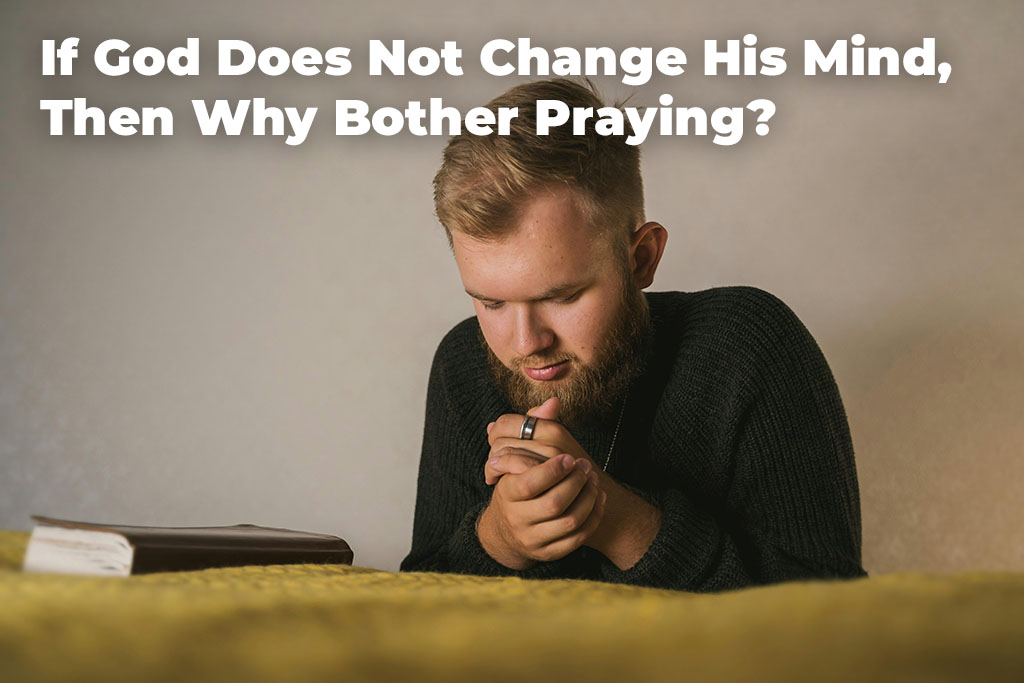
“If God’s constancy implies that he does not change his mind, plans, or actions, then how does one make sense of petitionary prayer?” Theology surrounding questions like these can be challenging, and it is worth taking the time to really think through them.
We must start with the understanding that according to Scripture, God is sovereign, and His will is unchangeable. Ephesians 1:11 makes this clear: God “works all things according to the counsel of His will.” We also know from Scripture that God is unchanging, or immutable. Malachi 3:6 says, “For I the Lord do not change; therefore you, O children of Jacob, are not consumed.” God’s character, purposes, and plans do not shift with time.
But when we think about prayer, especially petitionary prayer where we ask God for specific things, it does raise the question: if God doesn’t change and His plan is already laid out and “set in stone,” so to speak, what’s the point of asking Him for anything at all? Why not just let His history “play out?”
It’s helpful first to understand what prayer is. In its simplest form, prayer is communication with a personal God. We are speaking to a Father who knows us intimately, cares for us deeply, and invites us to speak to Him. James 5:16 says, “the prayer of a righteous person is powerful and effective.” Not only that, but the Bible encourages and even commands us to be in constant prayer. Believers are to pray unceasingly (1 Thessalonians 5:17) and boldly (Hebrews 4:16).
How does this fit with God’s unchanging nature? One way to approach it is by recognizing that prayer is not so much about changing God as it is about aligning ourselves with His will. In Matthew 7:7, Jesus says, “Ask, and it will be given to you; seek, and you will find; knock, and it will be opened to you.” Jesus gives us a direct invitation here to ask God for what we need and to trust that He listens and responds. 1 John 5:14 states, “This is the confidence we have in approaching God: that if we ask anything according to His will, He hears us.” There’s a balance. We ask, and He hears, but it’s within the boundaries of His unchanging will.
This is also evident in how Jesus prayed in the Garden of Gethsemane, when He said to the Father, “not my will, but yours be done” (Luke 22:42). Jesus, in His humanity, expressed a desire, but He perfectly submitted to the Father’s will instead of avoiding the full wrath of God by not going to the cross.
In this sense, when we pray, we’re not trying to convince God to do something He hadn’t planned. Instead, we’re participating in His sovereign will, which includes our prayers as part of how He brings about His purposes. This is where it becomes mysterious but beautiful…God ordains not only the ends but also the means – including our prayers. For example, in the above-quoted James 5:16. The effectiveness of the prayer doesn’t lie in the power of the person praying, but rather in God’s predetermined plan to use that prayer as one of the ways He accomplishes His will.
Prayer is one way God molds us into people who trust in His will. Over time, as we pray, our hearts are brought into deeper sync with God’s desires rather than our own. This is not to say that our prayers are totally meaningless; they work within the framework of God’s sovereign decree. We should still pray fervently for things we desire, yet always with an attitude of submission, knowing that God’s will is perfect, even when it may differ from our own.
Consider when a Christian prays for healing. We might pray for someone to recover from illness or an injury, and if they do, we rightly give thanks to God. But if they don’t recover, we have to remember that this, too, is within God’s perfect plan. It is not that our prayers were ineffective or ignored, but that God had a different and better purpose in mind – one that we may not understand on this side of eternity. Romans 8:28 assures us that “in all things God works for the good of those who love Him, who have been called according to His purpose.” Our prayers are part of that “all things,” even when the answer is not what we hoped for.
So, I believe that prayer is not only our way of communicating with the Almighty but about deepening our trust in His unchanging character and, at the same time, building our character. We pray because God commands it and because He has graciously chosen to involve us in His work. Through prayer to the Lord, we are drawn closer to Him, our desires are molded to look more like His, and we participate in His sovereign plan for the world.

One Comment
John
I still don’t understand if I’m praying for someone to get better with the sickness and it’s in God‘s plan that he doesn’t recover then why are my prayers no good offering up to him. sure I’m praying to my father being close to him, but that doesn’t help the person that I’m praying for.